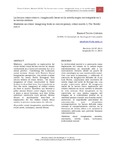La locura como crimen: imaginando locos en la novela negra contemporánea I; la novela nórdica

View/
Use this link to cite
http://hdl.handle.net/2183/14487Collections
Metadata
Show full item recordTitle
La locura como crimen: imaginando locos en la novela negra contemporánea I; la novela nórdicaAlternative Title(s)
Madness as crime: imagining fools in contemporary crime novels I; The Nordic novelAuthor(s)
Date
2014Citation
Revista Latina de Sociología,2014,4:73-89.ISSN: 2253-6469
Abstract
[RESUMEN]La enfermedad mental o la psicopatía como explicación del crimen en la novela negra contemporánea no responde sólo a un instrumento literario, desde un punto de vista sociológico es una construcción social. Con una tesis luhmaniana, y utilizando el concepto de Imaginarios Sociales de Juan Luis Pintos, analizamos siete escritores de novela negra del norte de Europa con una amplia repercusión global. El imaginario social de la locura como explicación del crimen violento en estas noveles es descrito en este artículo. Este imaginario se ha convertido en una piedra angular del estigma de la enfermedad mental en la sociedad porque cumple una función social: acrecentar la improbable posibilidad de comunicación ante situaciones incomprensibles. La locura definida como cercana al comportamiento criminal en la literatura de ficción ofrece a la sociedad la semántica adecuada para prevenir fracasos comunicativos. [ABSTRACT]
Madness - psychopathy as explanation for crime within crime-fiction cannot be simply understood as a literature creation but as a social product. Combining the Luhmann social systems theory with Pintos's Social Imaginaries perspective, this article analyze novels by seven North European best sellers writers of crime fiction. The social imaginary of crime constructed in these fictions is described here. Our hypothesis is that the social imaginary of violent crimes as close to mental disorders has become a pillar mental illness social stigma because it plays a social function; and that fiction literature constructs such picture. Mental illness or psychopathy described as explanation for the violent crimes helps society to prevent communicative failures.
Keywords
Imaginarios sociales
Psicopatía
Novela negra
Luhmann
Enfermedad mental
Social imaginaries
Psychopathy
Crime novel
Luhmann
Mental illness
Psicopatía
Novela negra
Luhmann
Enfermedad mental
Social imaginaries
Psychopathy
Crime novel
Luhmann
Mental illness
ISSN
2253-6469





